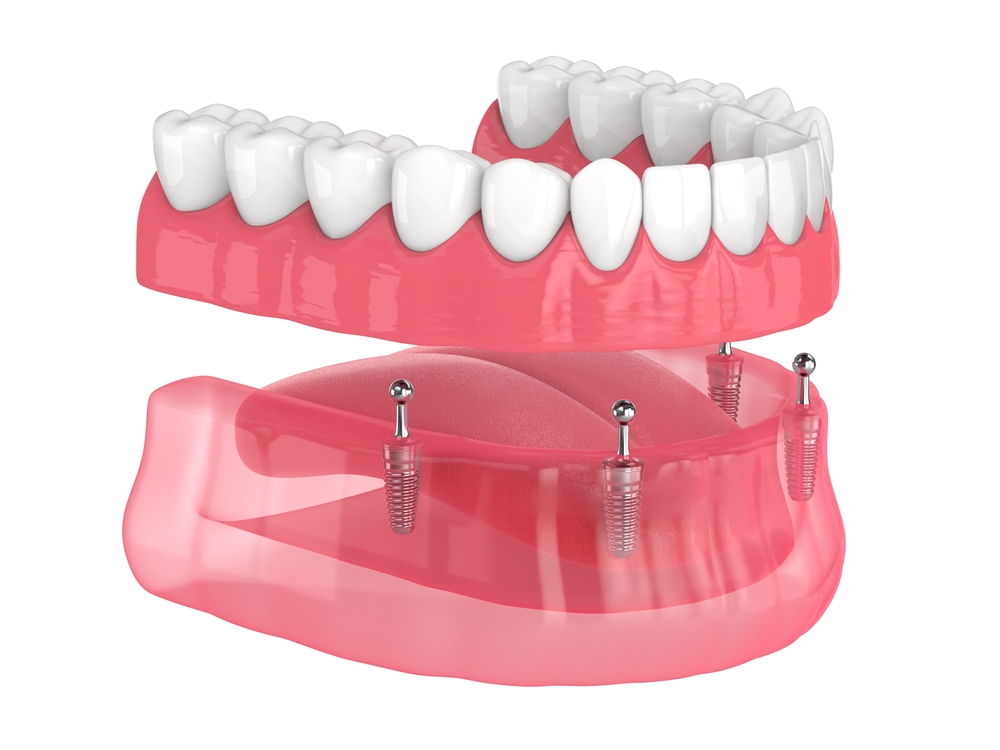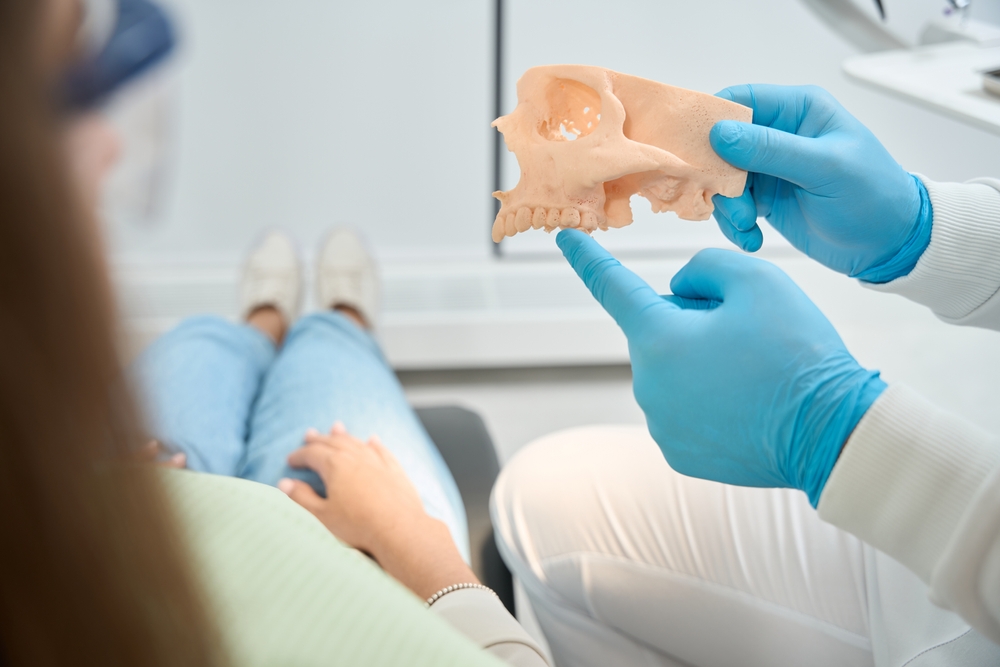Are You Tired of Loose, Uncomfortable Dentures?
Imagine never having to worry about your dentures slipping while you speak or eat again. With implant-supported dentures at Zajac Dental, your Halton Region dental practice, you can enjoy a permanent solution that feels and functions just like natural teeth. To schedule a consultation with our Ontario implant dentist, Dr. Pawel Zajac, call us at 905-901-3824 if you’re a new patient or 905-257-6900 if you’re current.
What Are Implant-Supported Dentures?
Implant-supported dentures, also known as overdentures, are anchored to the jawbone using dental implants. A dental implant is a small titanium post surgically inserted into the jawbone to serve as the foundation for the final denture itself. Once the implant has fused with the jawbone, an abutment is placed on top of the implant. The abutment attaches the denture to the implant, providing a secure and stable fit.
There are two types:
- Bar-retained
- Ball-retained
In a bar-retained implant-supported denture, a thin metal bar attaches to the implant abutments, and the denture snaps onto the bar. In a ball-retained implant-supported denture, each abutment has a ball-shaped connector, and the denture has a corresponding socket that snaps onto the ball.
Supported dentures replace missing teeth, up to an entire arch either in the upper or lower jaw. They’re typically recommended for people who have lost all or most of their natural teeth and have adequate jawbone density to support the implant. Unlike traditional dentures, which are secured to the gums using adhesives, implant-supported dentures don’t rely on the gums for support.
Benefits of Implant-Supported Dentures
Replacing your missing teeth with implant-supported dentures provides multiple benefits, including:
- Improved Stability and Security: Because dental implants are anchored to the jawbone, the dentures don’t rely on the gums for support, making them more stable and secure than traditional dentures. This means that people who wear them can speak and smile with confidence, knowing that their dentures won’t slip and slide around.
- Preservation of The Jawbone: When natural teeth are lost, the jawbone shrinks, which can cause the face to appear sunken and aged. However, with the help of an implant-supported denture, you can preserve the jawbone’s integrity.
- Improved Quality of Life: An implant-supported denture can help improve the quality of life for patients who have lost their natural teeth. They can restore the ability to eat a wide range of foods, speak clearly, and smile confidently, which can greatly improve self-esteem and well-being.
- Long-lasting: Implant-supported dentures can last for many years, sometimes even a lifetime, with the right dental care and maintenance.
- Natural-looking: These dentures look like natural teeth.
- Easy Maintenance: They’re easy to maintain and clean, just like natural teeth.
Cons Of Implant Supported Dentures
While there are many benefits to implant dentures, there are some potential drawbacks patients should know:
- Cost: They can be expensive, with costs ranging from several thousand to tens of thousands of dollars.
- Surgical Procedure: These dentures require dental implant surgery to place the implant posts, which can be invasive and require recovery time.
- Not Suitable for Everyone: Not all individuals are candidates. People who suffer bone loss may require bone grafting before implant placement, and people with certain systemic health conditions may not be good candidates.
- Temporary Discomfort: There may be some temporary discomfort or pain associated with the implant surgery and the healing process.
- Risk of Implant Failure: Although rare, there’s a risk of implant failure, which can occur if the dental implant doesn’t fuse properly during the healing phase.
The Implant-Supported Denture Process
Since dental implants support these dentures, patients will undergo oral surgery. The entire process can take anywhere between three and nine months to complete. At Zajac Dental, patients will experience the following:
- Initial Appointment: You’ll schedule your first appointment with Dr. Zajac to evaluate your oral health, discuss your dental history, and determine if implant dentures are the best solution for your needs.
- Procedure: Dr. Zajac will make a small incision into your gums and place the implant posts. Once all the needed posts are placed, they’ll close your incision with sutures and you’ll be sent home to begin the healing process.
- Healing: Over three to six months, the posts will naturally fuse with the bone in a process called osseointegration. This is necessary to provide a stable foundation for your denture restoration.
- Placing Your Dentures: Once you have fully healed, you’ll return to our Oakville dental office. Dr. Zajac will attach your custom dentures to the implants, providing you with a new, beautiful smile.
Are You a Candidate For Implant-Supported Dentures?
Implant-supported dentures offer a stable and long-lasting solution for individuals with multiple missing teeth. However, not everyone is an ideal candidate for this dental procedure. Here’s a detailed look at the factors that determine candidacy for implant-supported dentures:
Jawbone Health and Density
The most crucial factor in determining candidacy for implant-supported dentures is the condition of your jawbone. To be considered a suitable candidate, you need to have an adequate amount of bone, and the bone quality must be sufficiently robust to support the implants.
Dentists use 3D X-ray imaging to thoroughly evaluate the thickness, width, and height of your jawbone. This detailed assessment helps determine if your bone structure can effectively support the implants necessary for securing dentures. If you lack sufficient bone density, you may still have options:
- Bone Grafting: Bone grafting procedures can help build up the jawbone to support implant-supported dentures.
- Mini Dental Implants: These require less bone for placement, making them a viable option for patients with limited bone mass.
Overall Health
Candidates for implant-supported dentures should be in good overall health. This is because the placement of implants is a surgical procedure and, as such, entails a certain degree of risk. Systemic conditions that affect healing or increase the risk of infection may disqualify you from the procedure.
Oral Health
Good oral health is essential for the success of implant-supported dentures. Candidates should be free from gum disease and other oral infections that could compromise the healing process or the long-term success of the implants.
Smoking Status
Non-smokers are preferred candidates for implant-supported dentures. Smoking is forbidden while recovering from surgery, and patients are strongly encouraged not to smoke after recovery. Smoking increases the risk of many oral health problems, including gum disease, which could cause implant failure.
Commitment to Oral Hygiene
Candidates must be willing and able to maintain good oral hygiene practices. This includes regular brushing, flossing, and dental check-ups to ensure the longevity of the implants and dentures.
Age Considerations
While there’s no strict upper age limit for implant-supported dentures, candidates should be old enough to have completed facial growth, which typically occurs by late adolescence.
Expectations and Goals
Ideal candidates should have realistic expectations about the outcome of the procedure. They should understand that while implant-supported dentures offer significant improvements over traditional dentures, they still require proper care and maintenance.
Frequently Asked Questions
How long do implant-supported dentures last?
Are implant-supported dentures painful?
Can implant-supported dentures be removed?
How many dental implants are needed for an implant-supported denture?
Improve Your Appearance With Natural-Looking Tooth Replacements, Call Now!
If you’re looking for a denture solution that doesn’t require messy adhesives or slips and slides around in the mouth, implant-supported dentures may be your answer. For those in Burlington, Brampton, Toronto, and throughout the Oakville area, contact Dr. Zajac today at 905-901-3824 if you’re a new patient or 905-257-6900 if you’re current. We’ll help you determine the best option to replace your missing teeth and achieve your smile goals.




